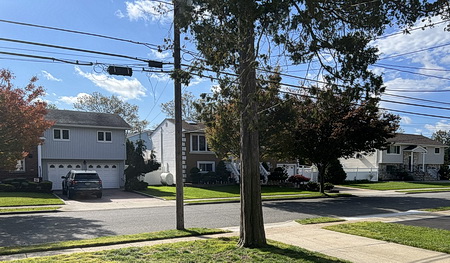
Most residential properties on Long Island are private homes and owning a home comes with a lot of responsibilities, but did you ever think of the legalities related to home owning? In this article, we are going to explore the legal terms associated with home ownership and we will explain them in non-legal, layman’s terms so that everyone can understand them. After all, not everyone is a lawyer 🙂.
The Land You Own!
It is your real property, that is, the grounds that surround your house, including what’s on top of it (grass, trees, etc), what’s below it, and what’s above it.
Air Rights
The owner of the property does have rights to what’s directly above his/her land, as high up as ‘infinity’, so long as it doesn’t interfere with aircraft traffic. Since the owner has these rights, this individual (or individuals if owned by more than one person) can sell those rights to someone else, but still maintain and own the property.
An example would be that the owner of a 3-story apartment building can sell his rights to another person who in turn can build 10 more stories above it.
A more sophisticated example is the building of Central Park Tower that resides at 217 West 57th, also called Billionaires Row. The builders of the tower wanted to extend its floor space and cantilever it over the existing and much smaller Art Student’s League building directly adjunct to it, but only after having to purchase the air rights from the owners of the Art Student’s League.

An owner can sell surface rights, subsurface rights, and air rights of the property individually if he/she owns it. Not to be confused with littoral and riparian rights which have to do with bodies of water. Other rights are severable rights where a contract can remain effective even if some or part of the contract has been found to not be enforceable.
The Encumbrances of Your Land
An encumbrance is a claim against your property. It is usually either by financial means (e.g. a mortgage or lien) or via personal property, called an easement. Easements exist when one party uses the property of another with or without permission. A utility pole placed on your property would be an easement and the utility company would pay you for the use of it.
There are two types of easements. Easement by apputenement refers to the agreement of two (usually adjacent) property owners to use some parcels of land for their benefit (e.g. a swimming pool) and is transferred to new property owners in a sale. An easement by prescription refers to the legal right of a nonproperty owner to use a property that he has been using illegally. Easement by prescription applies after this type of situation has existed for over 10 years.
Fixture
Aside from real property, if you have items that are physically attached to the structure of your home; such as a chandelier, it is referred to as a fixture and this comes into play when you sell the house.
Ornaments
Trees or bushes that you have decorated, noted as ornamental are also fixtures, but if you want to take them with you before you sell, you will have to dig them up.
The Legal Representations
Aside from the physical ownership factors, there is an abundance of terms that define ownership. Let’s take a look.
Freehold Estate
This term refers to the fact that you own your property for your lifetime. There are two sub-terms for freehold estates.
Fee Simple
All the rights are designated to the real estate owner without limitations except in special circumstances such as zoning laws or deed restrictions.
Fee Simple Absolute
The highest authority a property can have.
Fee Simple Determinable
Where absolute means exactly as it says – absolute authority, determinable states that the title will remain with the new owner so long as he/she does not defer from the policies stated in the contract, but if the new owner breaches the contract, the title defers back to the original owner. In other words, it is a contract that is determined by a circumstance. It is not absolute.
Life Estate
The property remains with the owner for his/her lifetime.
The Valuation Process
There are specific terms related to a property’s value. They are:
Highest and Best Use: This references the determination of a property that is used to extract the most profit.
Progression: This refers to a property’s value as compared to the other properties adjacent to it. If a particular property is in bad condition, such as a handyman special, the cost of that property can only decrease by a certain percentage based on the values of the properties surrounding it.
Regression: Similar in concept, but reverse. If a property is in good condition, but the surrounding properties are valued lower, the price of this property will not be as high as it should be if it were on a street where all the homes are in good condition. In other words, the value of a property is negatively affected by the other home in its immediate area.
Substitution: Simply means that the price of a house should not be higher than other homes nearby that are in the similar or same condition.
Who Can Live Where?
Most of us are familiar with rentals and leases but are the legal terms and policies associated with them?
Leasehold Estate
An easy one to remember because the word ‘lease’ is embedded in this term and simply means that the property owner gives some rights to another person to use their premises; such as a tenant.
Who’s Your Tenant?
‘Tenants’ does not just mean you are renting an apartment from a landlord, such as with the term leasehold estate. There are more specific terms that define tenancy in New York.
Tenancy in Common
At first glance, you might think this does have something to do with leasehold estates, but it has nothing to do with tenant ownership. What it does mean is that more than one individual owns a property and if one of the owners dies, there is no right of survivorship. This means that when an owner dies, the property is not given to the other owners by default. It would have to be mentioned in an external document such as a will. Additionally, the property can be unevenly divided among the owners.
Joint Tenancy
Here’s where the right of survivorship comes into play and is the major difference between tenancy in common and joint tenancy. In this scenario, if one of the property owners dies, the other owner(s) automatically take possession of the deceased owner’s share of the property.
Four Units of Joint Tenancy
All these are fairly the same with some technical exceptions.
- Unity of Interest: All parties share the same proportion of financial interest in the property. If there are four owners on the title, then each owner has a 25% share of ownership of the property.
- Unity of Possession: Same as Unity of Interest it specifies that this is only in the financial sense. No physical property is actually divided. For example, if the land owned is 100 square feet, the land is not divided by 4 among the owners.
- Unity of Time: Joint owners all take ownership of the title at the same time. Latecomers need not apply.
- Unity of Title: This simply means that all owners are on the title and deed.
Tenancy By the Entirety
This is an extension of tenants in common whereby there is more than one property owner, but it applies specifically to married couples, such that if one of the spouses dies, the other acquires ownership of the property by default.
Tenancy by Severalty
Simply means there is only one owner of the property.
Special Types of Property Ownership
Cooperatives (Co-ops)
Even though you had to get a mortgage for your co-op, you don’t own it. Instead, you have bought shares of ownership. So your mortgage represents not the property you are in, but the shares you own towards it. Besides the mortgage fee, you usually have to pay a maintenance fee. In New York, those fees can be tax deductible.
Condominium
Simply put, You buy space (the unit), not shares and you own this unit as a tenant in common, which could be an apartment in a building, a townhouse or a garden apartment.